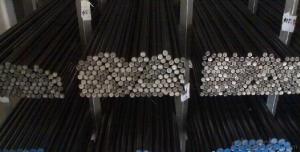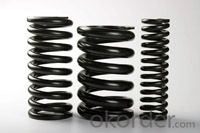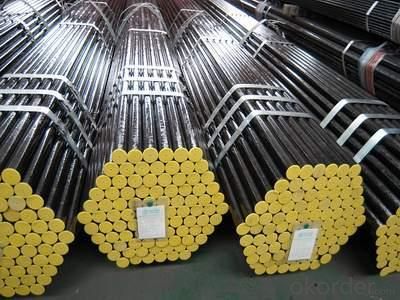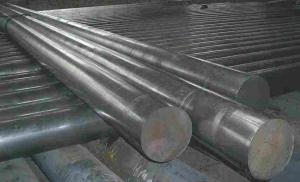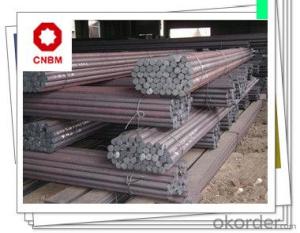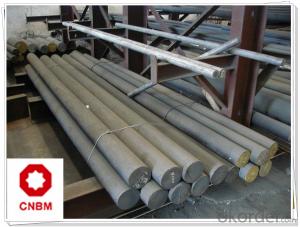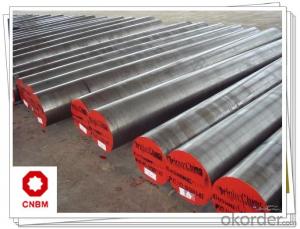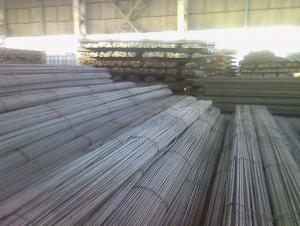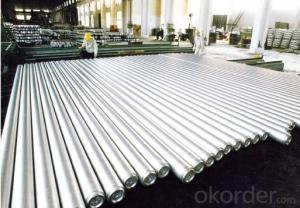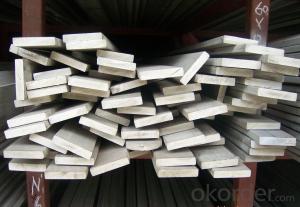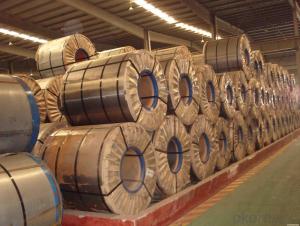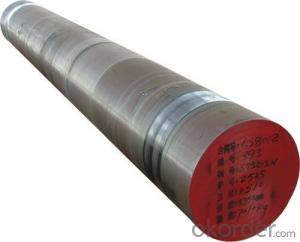Spring Steel 65Mn
- Loading Port:
- China Main Port
- Payment Terms:
- TT OR LC
- Min Order Qty:
- -
- Supply Capability:
- -
OKorder Service Pledge
Quality Product, Order Online Tracking, Timely Delivery
OKorder Financial Service
Credit Rating, Credit Services, Credit Purchasing
You Might Also Like
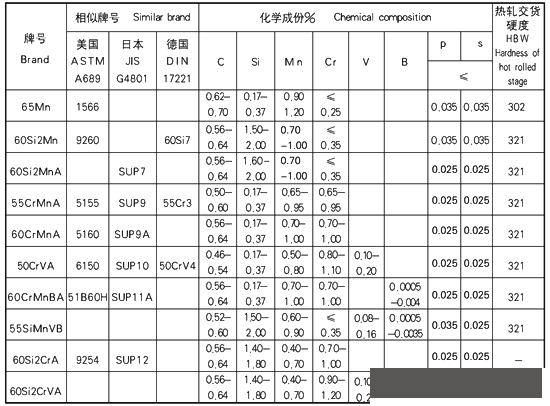
- Q: Can steel round bars be used in the manufacturing of flanges?
- Yes, steel round bars can be used in the manufacturing of flanges. They are commonly used to create the flange body, providing strength and durability for various applications. The round bars are typically machined and shaped to form the desired flange design, allowing for a secure connection between pipes, valves, or other equipment in a wide range of industrial settings.
- Q: What are the common alloying elements used in steel round bars?
- Steel round bars commonly contain alloying elements such as carbon, manganese, silicon, sulfur, and phosphorus. Carbon, the most significant alloying element, is responsible for the steel's strength and hardness. It enhances overall performance, increasing durability and resistance to wear and tear. Manganese, another crucial element, improves hardenability and strength while reducing brittleness and increasing toughness. Silicon is added to enhance the steel's resistance to oxidation, while small amounts of sulfur and phosphorus improve machinability. These alloying elements collaborate to produce steel round bars with specific properties suitable for various applications in industries such as construction, automotive, and manufacturing.
- Q: Can steel round bars be used in the oil and gas industry?
- Yes, steel round bars can be used in the oil and gas industry. Steel round bars are commonly used in various applications within the industry, including drilling, production, and transportation of oil and gas. These bars are highly durable and offer high strength, making them suitable for withstanding the harsh and demanding conditions that are typically found in the oil and gas sector. They are used in the construction of drilling equipment, such as drill collars and drill pipes, as well as in the production of valves, pumps, and other critical components. Additionally, steel round bars are used in the fabrication of pipelines and offshore platforms, where they provide structural support and ensure the integrity of the infrastructure. Overall, steel round bars are essential materials in the oil and gas industry due to their strength, reliability, and ability to withstand the challenging environments encountered in this sector.
- Q: What is the Young's modulus of a steel round bar?
- A steel round bar's Young's modulus is a measure of its stiffness or elasticity, determining how much it deforms under a given load. This material property is defined as the ratio of stress to strain. The Young's modulus for steel usually falls within the range of 190 to 210 gigapascals (GPa). This implies that the strain experienced by the bar is approximately 190 to 210 times greater than the stress applied. The Young's modulus of a specific steel round bar may differ due to various factors like the grade of steel, composition, and any heat treatment it has undergone. Hence, it is crucial to refer to relevant material specifications or conduct specific testing to establish the precise Young's modulus for a particular steel round bar.
- Q: Can steel round bars be painted or coated?
- Steel round bars can indeed be painted or coated, which is a widely adopted practice aimed at enhancing their appearance, safeguarding them against corrosion, and offering added functionality. Typically, this process involves thoroughly cleaning the bars' surface to eliminate any dirt, grease, or rust, and subsequently applying a primer or base coat, followed by a topcoat or finish. The choice of paint or coating relies on the particular requirements of the application, such as desired color, level of protection, or resistance to environmental conditions. Moreover, specific coatings can confer distinct properties, such as anti-slip, heat resistance, or chemical resistance. In general, painting or coating steel round bars proves to be an effective means of augmenting their aesthetics and durability.
- Q: Can steel round bars be used for making exercise equipment?
- Yes, steel round bars can be used for making exercise equipment. Steel round bars are known for their durability and strength, making them suitable for constructing various types of exercise equipment. They can be used to create weightlifting bars, dumbbells, barbells, and other fitness equipment that require sturdy and reliable materials. Additionally, steel round bars can be easily machined, welded, and shaped into different forms, allowing for customization and versatility in exercise equipment design. The use of steel round bars ensures that the exercise equipment can withstand heavy loads and provide stability during workouts, making them a popular choice among gym equipment manufacturers and fitness enthusiasts.
- Q: Can steel round bars be coated for improved aesthetics?
- Yes, steel round bars can be coated for improved aesthetics. Coating steel round bars can enhance their appearance by providing a more polished and visually appealing surface. There are various coating options available, such as powder coating, electroplating, or painting, which can be applied to steel round bars to achieve different aesthetic effects. These coatings not only enhance the appearance of the bars but also provide additional benefits such as corrosion resistance and durability. Therefore, coating steel round bars is a common practice to improve their aesthetics in various applications including architectural, decorative, and industrial purposes.
- Q: What are the advantages of using heat-resistant steel round bars?
- There are several advantages of using heat-resistant steel round bars. Firstly, heat-resistant steel round bars are specifically designed to withstand high temperatures without losing their mechanical properties. This means they can maintain their strength and structural integrity even in extreme heat conditions. Secondly, heat-resistant steel round bars have excellent corrosion resistance. This makes them highly durable and suitable for use in environments where they may be exposed to corrosive substances or chemicals. Their resistance to corrosion ensures a longer lifespan and reduces the need for frequent maintenance or replacement. Additionally, heat-resistant steel round bars have superior thermal conductivity. This property allows them to efficiently transfer heat, which can be beneficial in various applications. For example, in industries like power generation or petrochemicals, where heat transfer is crucial, using heat-resistant steel round bars ensures optimal performance and energy efficiency. Furthermore, heat-resistant steel round bars offer excellent dimensional stability. Even when subjected to high temperatures, they maintain their shape and size without warping or deforming. This property is particularly important in applications where precise measurements and tight tolerances are required. Lastly, heat-resistant steel round bars are readily available in various sizes and grades, offering versatility in their applications. They can be used in a wide range of industries such as aerospace, automotive, construction, and manufacturing, where high temperatures are involved. In conclusion, the advantages of using heat-resistant steel round bars include their ability to withstand high temperatures, excellent corrosion resistance, superior thermal conductivity, dimensional stability, and versatility in applications. These benefits make them an ideal choice for industries requiring materials that can perform reliably under extreme heat conditions.
- Q: Can steel round bars be used for making security grilles?
- Certainly! Security grilles can be made using steel round bars. Steel, being a sturdy and durable material, offers excellent protection for windows and doors. By welding round bars together, a robust framework for the security grilles can be created. Moreover, steel round bars are highly customizable and can be shaped to fit any size or design requirement, making them suitable for various types of security grilles. The hardness and toughness of steel also make it resistant to cutting or tampering, thereby enhancing the security features of the grilles. All in all, steel round bars are a dependable option for creating security grilles due to their strength, durability, and customization capabilities.
- Q: Can the same grade steel instead of round bar be ok?
- Physical and mechanical properties are different. Because of the different chemical composition and strength of reinforcing steel, they are different in physical and mechanical properties. The cold bending property of steel is good, can make the hook 180, screw steel can only make straight hook 90 degrees; steel weldability is good, with ordinary carbon steel electrode can be used to low alloy electrode; anti fatigue performance and toughness in steel bar is good.
Send your message to us
Spring Steel 65Mn
- Loading Port:
- China Main Port
- Payment Terms:
- TT OR LC
- Min Order Qty:
- -
- Supply Capability:
- -
OKorder Service Pledge
Quality Product, Order Online Tracking, Timely Delivery
OKorder Financial Service
Credit Rating, Credit Services, Credit Purchasing
Similar products
Hot products
Hot Searches
Related keywords
